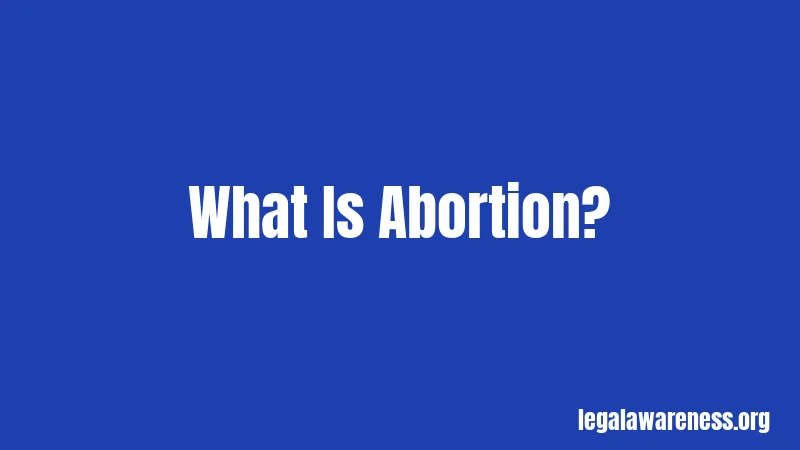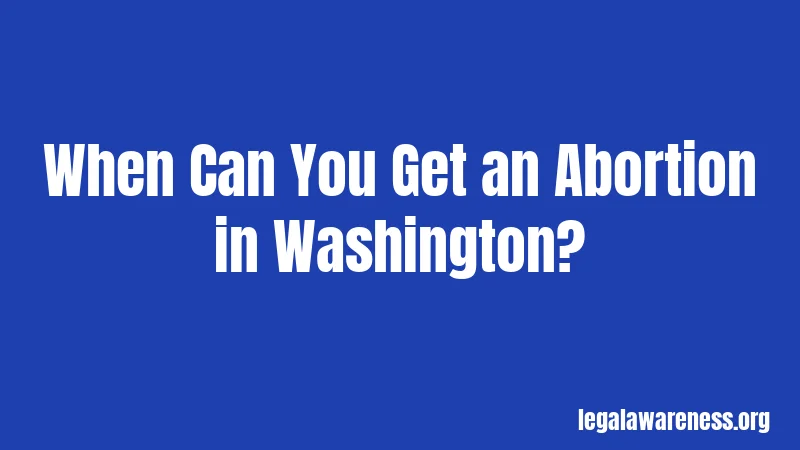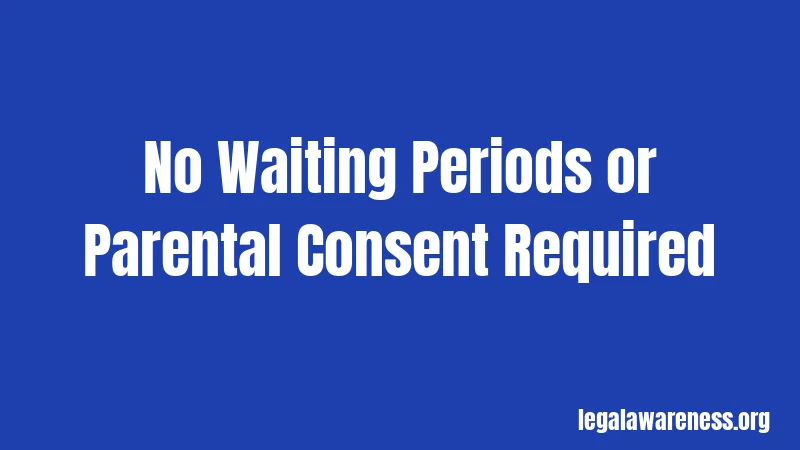Abortion Laws in Washington (2026): Your Rights Are Protected Here
Most people don’t realize Washington was protecting abortion rights decades before Roe v. Wade even existed. Seriously. This state has been a leader in reproductive freedom since 1970. And even after the Supreme Court overturned Roe in 2022, nothing changed here.
If you live in Washington or plan to travel here for care, you’re protected by some of the strongest abortion laws in the country. Let’s break down exactly what that means for you.
What Is Abortion?

Abortion is a medical procedure that ends a pregnancy. It can happen two ways. The first is medication abortion, where you take pills to end an early pregnancy. The second is an in-clinic procedure, where a healthcare provider removes pregnancy tissue.
Both options are safe, legal, and available in Washington. Pretty straightforward, right?
Is Abortion Legal in Washington?
Yes. Abortion is fully legal in Washington state.
Here’s the deal. Washington legalized abortion in 1970. That was three years before the Supreme Court decided Roe v. Wade. The state was actually one of the first in the nation to let voters decide on abortion access.
Then in 1991, Washington voters passed Initiative 120. This is also called the Reproductive Privacy Act. It put abortion rights directly into state law. The initiative declared that every person has a fundamental right to privacy when it comes to reproductive decisions.
Hold on, this part is important. When the Supreme Court overturned Roe v. Wade in June 2022, Washington’s laws stayed exactly the same. Your rights here didn’t change at all.
When Can You Get an Abortion in Washington?

You can get an abortion in Washington up until the point of fetal viability. Viability means when a fetus could potentially survive outside the uterus. This is typically somewhere between 24 and 28 weeks of pregnancy. Your doctor makes this determination based on your specific situation.
After viability, abortion is still legal in Washington. But only if continuing the pregnancy would put your life or health at risk. A doctor must make this medical judgment.
Wondering what counts as a health risk? It includes both physical and mental health. Your healthcare provider decides what qualifies based on medical standards.
Who Can Provide Abortion Care?
Washington allows many types of healthcare providers to perform abortions. You don’t have to see a physician. Nurse practitioners, physician assistants, and other qualified providers can also provide abortion care.
This actually makes it easier to access services. You might be able to get early abortion care from your regular primary care provider. You don’t always need to visit a special clinic.
The state currently has around 46 clinics that provide abortion services. Many are Planned Parenthood locations. Others are independent clinics, hospitals, and family medicine practices.
No Waiting Periods or Parental Consent Required

Okay, pause. Read this carefully.
Washington has none of the restrictions that many other states impose. There’s no mandatory waiting period before your procedure. There’s no required counseling designed to discourage you. There’s no ultrasound requirement where you’re forced to view images.
What about minors? In Washington, people under 18 have the legal right to make their own choices about pregnancy. You do not need to tell your parents. You do not need their permission. Your medical records about the abortion are confidential.
This is pretty unique compared to many other states. Most people don’t realize how different Washington’s approach is.
How Much Does an Abortion Cost?
The cost depends on several factors. These include how far along your pregnancy is, what type of abortion you choose, and where you go for care.
A medication abortion is typically less expensive than an in-clinic procedure. First-trimester abortions cost less than later procedures. The national average for a first-trimester abortion is around $600.
But here’s good news for Washington residents. You might not pay anything out of pocket.
Insurance Coverage for Abortion
Washington has strong laws protecting insurance coverage for abortion. The state’s Reproductive Parity Act requires all state-regulated health plans that cover maternity care to also cover abortion services.
And starting in January 2024, these plans cannot charge you a copay for abortion. That means no deductibles or coinsurance for this specific service. This is a big deal because many people used to face hundreds of dollars in out-of-pocket costs.
If your employer has religious objections to covering abortion, your insurer must still provide the coverage directly to you at no cost.
Washington Apple Health, the state’s Medicaid program, covers abortion services. This includes the procedure itself, follow-up care for up to 12 months, and post-abortion contraception. If your income is low, you might qualify for this free coverage.
Don’t have insurance? Several options exist. Many clinics offer sliding-scale fees based on your income. The Northwest Abortion Access Fund helps people pay for abortions in Washington, Oregon, Idaho, and Alaska. They can also help with travel costs.
The Shield Law: Protection from Other States
Now, here’s where things get really interesting.
In April 2023, Governor Jay Inslee signed the Shield Law. This protects people in Washington from legal actions by states that have banned or restricted abortion.
Think of it like this. If you live in Idaho or Texas, where abortion is banned, you can still travel to Washington for care. The Shield Law means Washington won’t help those other states investigate or prosecute you.
Specifically, Washington’s Shield Law does several things. It prohibits Washington law enforcement from arresting people based on another state’s anti-abortion laws. It blocks Washington courts from issuing subpoenas that seek information about abortions. It prevents the governor from extraditing someone to another state for prosecution related to abortion care.
The law also protects healthcare providers. If a doctor in Washington provides an abortion to someone from Idaho, Idaho can’t use Washington’s legal system against that doctor.
Sound complicated? It’s actually not. The bottom line is simple. What happens in Washington stays in Washington when it comes to your reproductive healthcare.
Privacy Protections for Your Health Data
Washington passed another groundbreaking law in 2023. The My Health My Data Act protects your personal health information.
Here’s why this matters. After Roe was overturned, many people worried about period-tracking apps and other health apps sharing their data. That data could theoretically be used by states with abortion bans to prosecute people.
Washington’s law requires companies to get your clear consent before collecting health data. They can’t sell your health information without written permission. The law also bans geofencing around healthcare facilities. This means companies can’t track when you visit an abortion clinic.
Honestly, this is the most comprehensive health data privacy law in the country. It goes way beyond what federal HIPAA protections offer.
Can You Travel to Washington for an Abortion?
Absolutely. You don’t need to be a Washington resident to get an abortion here. You don’t need to prove citizenship or immigration status. Anyone can access care.
Since Roe was overturned, more people have been traveling to Washington from states with bans. Especially from Idaho, where a near-total abortion ban went into effect. Planned Parenthood reported that out-of-state patients at Washington clinics increased significantly after Idaho’s ban.
If you’re coming from another state, remember that Washington’s Shield Law protects you while you’re here. But check the laws in your home state too. Some states have tried to restrict people from traveling for abortion care.
Types of Abortion Available
Two main types of abortion are available in Washington.
Medication abortion uses pills to end an early pregnancy. It’s available up to about 11-12 weeks of pregnancy. You take two different medications, usually mifepristone and misoprostol. This can be done through telehealth in Washington. That means you might get the pills mailed to your home after a video consultation.
In-clinic abortion, sometimes called surgical abortion, involves a medical procedure. It’s available throughout pregnancy up to viability. For earlier pregnancies, it typically takes just a few minutes. For later pregnancies, it might require more than one visit.
Both options are very safe. Medication abortion is about as safe as taking Tylenol, according to medical research.
Washington’s Mifepristone Stockpile
You’re gonna love this one. Washington was the first state to stockpile abortion pills.
In 2023, when federal lawsuits threatened access to mifepristone nationwide, Governor Inslee took action. He directed the state Department of Corrections to use its pharmacy license to purchase 30,000 doses of mifepristone. This was roughly a three-year supply.
The University of Washington obtained another 10,000 doses. The goal was to ensure Washington residents would have access to medication abortion regardless of what happened in federal courts.
The U.S. Supreme Court ultimately preserved mifepristone access in 2024. But Washington still maintains a stockpile as insurance against future legal challenges. As of late 2025, the state still has thousands of doses on hand.
Protections at Abortion Clinics
Washington law protects your access to healthcare facilities. It’s illegal for protesters to physically block you from entering a clinic. They can’t assault, detain, or injure you. They can’t damage clinic property. They can’t make threats.
If any of these things happen to you, document what occurred. Tell the clinic staff. You can call 911 if you feel physically threatened. The specific law is RCW 9A.50.020.
Protesters can stand outside clinics and hold signs. They can speak to you from a distance. But they cannot prevent you from getting care.
Watch Out for Crisis Pregnancy Centers
Not sure what counts as a legitimate clinic? Here’s what you need to know.
Crisis pregnancy centers, sometimes called pregnancy resource centers, look like medical clinics. But they’re not. These centers typically have a religious mission to discourage abortion. Many don’t have licensed medical professionals on staff.
They might offer free pregnancy tests to get you in the door. But they won’t provide abortion services or referrals. They may give you inaccurate information designed to scare you.
How do you tell the difference? Legitimate abortion providers will clearly state they provide abortion services. They’ll give you medically accurate information. They won’t pressure you toward a specific decision.
Use trusted resources like AbortionFinder.org to find verified providers. Or contact your regular doctor for a referral.
How to Find an Abortion Provider
Finding care is easier than you might think.
Contact your regular healthcare provider. They can often provide early medication abortion or give you a referral. Use AbortionFinder.org for a directory of verified abortion providers. Contact Planned Parenthood, which has multiple locations throughout Washington. Call the Northwest Abortion Access Fund at 1-866-692-2310 for help finding a provider and financial assistance. Use the Chat with Charley tool from Pro-Choice Washington for information.
You can also get abortion services through telehealth. This means a video appointment with a provider who can prescribe medication abortion and have pills mailed to you. Plan C has information about telehealth options.
Helping Someone Get an Abortion
In Washington, it’s completely legal to help someone access abortion care. You can help pay for the procedure. You can drive them to appointments. You can provide emotional support. You can help with travel logistics.
The Shield Law specifically protects people who assist others in accessing reproductive healthcare. This includes helping someone from another state travel to Washington for care.
However, be aware of laws in other states. Idaho, for example, has made it illegal to help a minor travel out of state for an abortion without parental consent.
Frequently Asked Questions
Can I get an abortion if I’m under 18? Yes. In Washington, minors can consent to their own abortion care without parental involvement. Your medical records are confidential.
Will my parents find out through insurance? Possibly. Insurance companies may send billing information to the primary policyholder. You can request that communications about your abortion go to a separate address. Fill out a confidentiality form with your insurer.
How late can I get an abortion? Up to fetal viability, typically 24-28 weeks. After viability, only if your life or health is at risk.
Do I have to be a Washington resident? No. Anyone can access abortion care in Washington regardless of where they live.
Will I be prosecuted if I travel from a state with an abortion ban? Not in Washington. The Shield Law prevents Washington from cooperating with other states’ investigations. Check your home state’s laws though.
Final Thoughts
Washington has protected abortion rights for over 50 years. The state continues to strengthen those protections as other states restrict access.
Whether you’re a long-time resident or traveling from out of state, you have strong legal protections here. Your right to reproductive healthcare is enshrined in state law. Your privacy is protected. And multiple safety nets exist to help you afford care.
If you need an abortion, don’t let fear or misinformation stop you. Use trusted resources to find a provider. Ask about financial assistance if cost is a concern. Know your rights.
Now you know the basics. Stay informed, stay safe, and reach out to the resources listed here if you need help.
References
- Washington State Legislature, Chapter 9.02 RCW: Abortion – https://app.leg.wa.gov/rcw/default.aspx?cite=9.02&full=true
- Washington State Attorney General, Shield Law Information – https://www.atg.wa.gov/reproductive-and-gender-affirming-care-shielding-providers-seekers-and-helpers-out-state-legal
- Washington State Department of Health, Abortion Information – https://doh.wa.gov/you-and-your-family/sexual-and-reproductive-health/abortion
- Washington State Office of the Insurance Commissioner, Coverage for Abortion Services – https://www.insurance.wa.gov/coverage-abortion-services
- Center for Reproductive Rights, Washington State Profile – https://reproductiverights.org/maps/state/washington/
